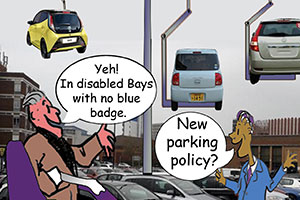Jenni Meredith discusses the hidden disability Blue Badge extension

UCan2 Jenni Meredith warns that although the legislation is changing, there’s more to be done if everyone who needs a Blue Badge is to receive one – and find somewhere to park! Some of you reading this, will have taken part in last year’s consultation about extending the Blue Badge scheme to those with hidden disabilities. But most of us know from public dialogues in other fields, such as planning or health care changes, that the consultation process is merely an exercise. It gives civil servants experience in producing forms, creating charts of the results and providing statistics for the press department, but almost always the opinions of the public are ignored, unless of course those opinions coincide with what the consulting authority wanted to hear. Too cynical a view? Well, perhaps. In any case, this consultation was slightly different. The overwhelming response was positive. We’ve only just begun… However, in widening the eligibility for a blue badge the Department for Transport will also need to plan for more on-street parking spaces and presumably to issue new guidelines to increase the mandatory percentage of disabled parking bays in private car parks, such as those at supermarkets, hospitals, galleries and museums, etc. Plus, there is likely to be more abuse of the system if non-disabled drivers think they can get away more easily with parking in a disabled bay, claiming a hidden disability — ‘Oops! Forgot the blue badge’, or ‘…It’s in the post’. In May at a Gloucestershire car park, not one but two cars parked in disabled bays when the car park was otherwise almost empty. Why do some people behave so arrogantly and with such disregard for others? In the same week in Liverpool two women came to blows over who should be parked in a disabled parking bay – and neither of those two had a disability. It’s not just the general public who abuse the scheme either. One Government Minister, in his efforts to be re-elected, was caught blocking a disabled parking bay with his campaign posters. That was in Australia, so at least it’s not only in England that we suffer from ignorant MPs. Is technology the answer? One solution, pictured in the cartoon, could kill two birds with one piece of technology. You wouldn’t be too keen to find your car hanging in the air if you unlawfully parked in a disabled bay, would you? Technologies exist to stack cars in a sort of rotating pile, so that the driver merely needs to drive into one spot and the car is then moved along a vertical conveyor belt, something like the London Eye, to one of the upper positions. But these are mainly used at ports, shipping cars to other destinations. It seems feasible in that situation where the cars are all empty. Combine this with self-parking cars and you might have a solution for disability parking. A blue badge holder could park really close to the entrance of, say a supermarket, then command the car to go and park anywhere in a stack. When the owner exits the store, all they would have to do would be to summon the car with their key fob and it would arrive at the entrance within minutes, ready to be manually driven again. I suppose we need to wait for the teething problems to be ironed out on this technology, and for the price to drop too. But I like the idea of a car behaving rather like a faithful work-horse. Let’s not pass the buck In Wales, people with certain hidden disabilities have been eligible for a blue badge under an extension of the scheme since 2014.The Welsh Government ruled that people with cognitive impairments including autism could successfully apply for a blue badge. However it’s not all good news there either. In reality it has proved difficult for people in certain parts of Wales to convince their local authorities that they are, in fact eligible under the extended criteria. The problem, as usual, lies in the interpretation of words. The Government says local authorities have the responsibility for deciding who is and who isn’t eligible and the local authorities say they are following Government guidelines. It’s a familiar scene of buck-passing and confusion. One authority has an autism team to assist applicants, whilst others refuse applications if there is not ‘sufficient supportive medical evidence’. Maybe when the English and Irish extended scheme finally comes into effect, it will be just such a postcode lottery— hopefully not. Jenni who writes health-related poetry – at wordsart.co.uk • Cartoon by Tony Meredith